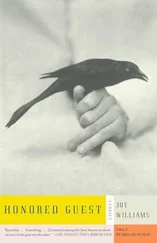“An annal of crime,” I say and curl up within my stained nightgown, comforting myself as though it is I who am being told the tale rather than being the taleteller. There is a glass of cold coffee on the floor. I hear it fall as the bed, on its casters, grinds against it. The child redistributes itself, opening and closing itself like a butterfly. I say,
“In the French mountains in the sixteenth century, an eleven-year-old girl was married and some years later the wedding was consummated and she had a baby boy. She was very much in love …” I stop and inquire about the hound, whether there are any indications that it’s returned. I fall asleep but in no time I am up, pummeling my foot. I mention a party we went to at the home of one of Grady’s friends. There were twenty people there, the same little band that are always present at the parties we attend. Expecting little from these gatherings, it nevertheless gives us no pleasure when our suspicions continually prove correct. Some of the people are students at the college but they do not recognize me for I’ve removed my sorority pin. All that remain are two tiny holes on the right side of every blouse. They don’t know that I am pregnant and they don’t know that I am married to Grady. At one of the parties, a man fell against me and knocked me flat. I had hoped that something might come of it, that the baby would be expelled. Nothing came of it except that now the man comes to me at every party and speaks to me earnestly. He wears tight jerseys with alligators on them. Tiny alligators like jewels. At the party most recently, he came to me in the kitchen where I was drinking gin and eating from a shallow dish of hamburger relish. He was an older man from the college, possibly even an instructor. He had sweat on his hairline, above his lip. He embraced me and I turned rigid. A camouflage. I became part of the sink and tiles. He pressed his mouth against me and wedged the plastic glass of martini between. Beyond his head, on rough drawing paper, I saw crayon renditions of a child’s moon, house and railroad train. I pushed him fretfully away. He was the host. He pushed me back, slightly.
“Well, kiss my coccyx,” he said. He left with dignity, his ass high up his back, like many basketball players I have seen, playing in their prime.
I tell Grady this and slump down in the bed again, turning on my side. The sheet’s pulled back and I rest my cheek on mattress ticking. My mouth moves against a small cloth tag attached with a safety pin. Contents Unknown. Well.
At the window, tiny dots of light shine through the mess. A spider pushes a leaf out of its web. Grady’s told her that there’s something in a spider’s web that mends a cut. Something in the spinning juice. If I should smash one of my limbs through this window, there’d be nothing that wasn’t fine. Damage and repair would be simultaneous. The healing is working out there before any wound that needs it. This is the way it’s always been, I suppose, but never, before Grady, has it been true for me.
I move raptly on the bed. I am an impediment to our lives together. I want to tell him. The moments pass. None of them are correct. The baby goes about its mysterious business. It has formed eyebrows, a lung, certainly a sex. I want to tell him. I will say, “Perhaps the baby isn’t yours.” That is nothing. He suspects this, I know, and yet he has said nothing. My womb is a disease, a benign tumor. I despise my womanliness which carries its sickness about with it, inherent and innate, as though it were success. How can a man know such dyscrasia? I move back against the pillows. The light is so bad that it obscures my speech.
If I begin the story and do not finish it or if I begin it and do not tell it properly in the way it happened, in the time and the place and the circumstance, in the correct sequence of results, will it not then persist like a drowned man, going on to haunt the sea?
I am trapped within this monstrous child. Each day I become precisely less what the unborn has become. If I tell Grady, will I release myself like a virus upon his loving world? The child is not Grady’s. That is nothing. That will cause no conclusion. He assumes responsibility after the movie house, not before. I know this. His pride lies in acceptance, renewal and life.
I am shivering for now I am fully awake and it is cold here. I reach down and turn the dial of our small electric heater. Its red grille and smell and clatter give the impression of warmth. I am only a nest and so cold. The child rocks in its sunlight, warm and breathing in its egg.
“I almost died the other day,” I say.
“That’s ridiculous,” Grady says.
“No, I had some bullets in my pocket and I forgot about them and I was baking chicken and the oven was very hot. I was working around the oven and the bullets were in my pocket.”
“That’s ridiculous,” he says, “they never would have gone off.”
I get out of bed and limp toward him on my aching foot. Grady does not sit in the chair at all. It is his jeans, his sweater scattered realistically in the chair. I pull on his jeans, retaining the nightgown over them, and limp into the kitchen, skirting the dog’s dish. I heat a pan of water, making some coffee with part of it and using the rest to soak my foot. The dog hasn’t been at the trailer for days. He sits a mile away, at the juncture of an overgrown logging rut and the blacktop that goes into town. He sits beneath an enormous tree. When we slow the car for him, he regards us pleasantly enough but he does not get into the car, nor does he look after us as we drive away. The hound is waiting for his owner to come pick him up because he is a good redbone. And good redbones are trained to return to where they were released and to stay there forever.
I miss the dog. Only yesterday or so, I walked to the blacktop and brought him some food — fatty ribs and mash that we feed the ducks. He sits in the shade beneath the tree. In front of him is a deep ditch that catches and holds the afternoon rains. He had been very happy at seeing me and he’d eaten the food like a fellow of means and leisure and he had taken time out to watch me as I sat watching him. But he didn’t follow me home. And I know he never is about to. He has his own fidelities and they don’t include us.
I dry my foot, and go outside. Grady has built a fire in an old washtub and is sitting before it, throwing straw and dead branches on it from time to time. Beside him are four ducks, rearranging themselves continually on a patch of straw. They are dull barnyard ducks of unstable numbers for some wander off across the river and are eaten. At times, I collect their down which is bleakly sensual and useless in quantity. They set up a terrific racket as I approach and fly off into short trees.
It’s cold and the fire burns cleanly in the air, without smoke. Sometimes, sharks come up this river by mistake. I lumber toward Grady, awkward as a cub, bumping against him remotely, an unburnt branch on a cant from the fire, snagging my nightgown. Some things cannot be forgiven. Grady is not the one to forgive.
I crouch behind him and put my arms around his chest. Grady stirs the fire and the flames snapping in the weak sunshine are blond as his eyes. “How are you two this morning?” he asks.
“We’re fine,” I decide to say. “We’re coming along nicely.”
He shares a piece of bread with me. I take it and push it into the shape of a pony. Just as I crimp its mane, it trots away.
Don’t look, Father says.
I struggle for effect but my intention never lay in looking.
I say to the ducks, “Weather cold enough for you?” My life is prudent, recessive and dark. Every day is Christmas Eve. I talk to the animals but they do not talk to me.
Читать дальше












